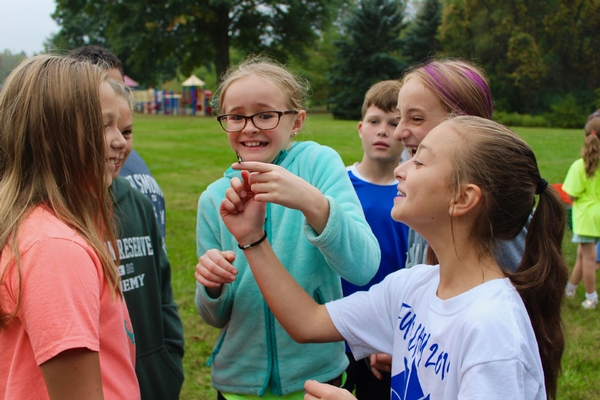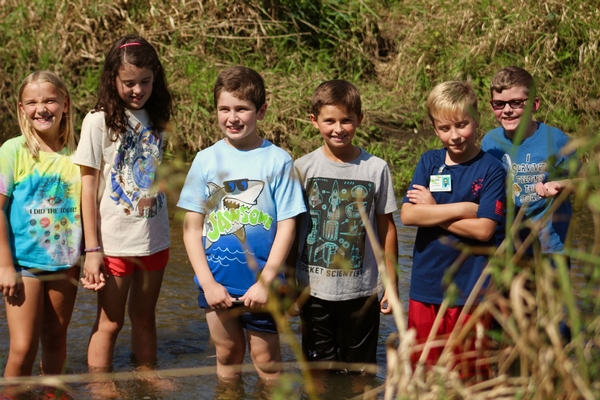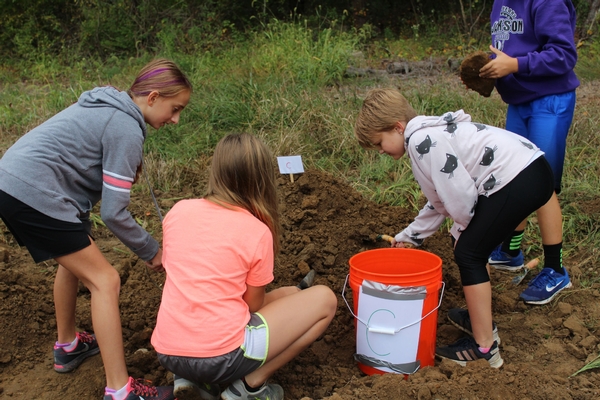Intermediate School
Intermediate School Curriculum Overview
Language Arts
Grammar: We will be using Easy Grammar workbooks. Topics of study within Grammar include prepositions, verbs, nouns, conjunctions, types of sentences, interjections, adjectives, adverbs, pronouns, friendly letter writing, capitalization, and punctuation.
Vocabulary: We will be using the iWordly Wise 3000 online vocabulary program and vocabulary extracted from Social Studies and class novel studies. Topics of study will include vocabulary word practice that includes spelling, definitions, context, and multiple meanings.
Reading: We will be using Scholastic News for non-fiction current events and close reading practice, readers theater, and class novels for instruction. Topics of study will include elements of a story, citing text evidence, and research skills.
Writing: We will be using Just Write! (a research writing workbook), the Writing Express program, and journal writing. Students will practice writing formally and informally.
Spelling: We will be using iWordly Wise 3000 vocabulary words in conjunction with spelling.
Math
In Mathematics class this year we will be covering an array of topics as outlined in the Common Core Standards for Mathematics. We will use the Everyday Mathematics program to deliver the curriculum. Topics of focus will include math tools, time, multiplication, number stories and arrays, operations such as column addition and subtraction, properties of multiplication, measurement, geometry, fractions, and beginning division. Many of these topics will continue to be built upon as they progress through their academic career. Some topics will be taught in brief, while others will be taught in more depth.
Social Studies
The local community serves as the focal point for third grade as students begin to understand how their communities have changed over time and to make comparisons with communities in other places. The study of local history comes alive through the use of artifacts and documents. They also learn how communities are governed and how the local economy is organized.
Science
Science meets three times every six days. Students will learn about the process of scientific inquiry. Topics will come from the three main branches of science (Life, Earth and Space, and Physical), and are based on the Ohio Learning Standards. By the end of third grade, students will be able to understand and explain that:
*Earth’s nonliving resources have specific properties.
*Earth’s resources can be used for energy.
*Some of Earth’s resources are limited.
*All objects and substances in the natural world are composed of matter.
*Matter exists in different states, each of which has different properties.
*Heat, electrical energy, light, sound and magnetic energy are forms of energy.
*Offspring resemble their parents and each other.
*Individuals of the same kind of organism differ in their inherited traits. These differences give some individuals an advantage in surviving and/or reproducing.
*Plants and animals have life cycles that are part of their adaptations for survival in their natural environments
Technology
Third grade students are assigned their own MacAir laptop and consistently develop skills in browsing, keyboarding, and creating various documents, presentations, and videos using Mac programs, google docs, and google slides. Technology meets once every six days. Students also have a scheduled keyboarding time once every six days. Technology topics include an introduction to online research, internet safety, coding, and Google Docs/Slides/Sheets. Keyboarding focuses on maintaining correct posture to avoid aches and pains, using the home row and correct fingering, accuracy, and speed. The curriculum is based on the Ohio Learning Standards and the ISTE (International Society for Technology in Education) Standards.
Spanish
Spanish lessons will cover a variety of themes and introduce students to basic expressions, words and phrases, through reading, speaking, and listening. Students will be involved in communicative games, language experience activities, songs, rhymes, children’s literature, physical activity, role plays, dialogues, and listening activities.
Additional Classes
Our students also have Art, Library, Physical Education, Music and Movement. Information about those classes can be found on their respective pages.
Language Arts
Grammar: We will be using Easy Grammar workbooks. Topics of study within Grammar include prepositions, verbs, subjects, compound subjects, nouns, types of sentences, conjunctions, interjections, adjectives, adverbs, pronouns, addressing an envelope, capitalization, punctuation, and items in a series.
Vocabulary: We will be using the iWordly Wise 3000 online vocabulary program and vocabulary extracted from Social Studies and class novel studies. Topics of study will include vocabulary word practice that includes spelling, definitions, context, and multiple meanings.
Reading: We will be using Scholastic News for non-fiction current events and close reading practice, readers theater, and class novels for instruction. Topics of study will include elements of a story, inference skills, and research skills.
Writing: We will be using Just Write! (a research writing workbook), the Writing Express program, and journal writing. Students will practice writing formally and informally.
Spelling: We will be using iWordly Wise 3000 vocabulary words in conjunction with spelling.
Math
In Mathematics class this year we will be covering an array of topics as outlined in the Common Core Standards for Mathematics. We will use the Everyday Mathematics program to deliver the curriculum. Topics of focus will include place value, multidigit addition and subtraction, estimation strategies, multiples, prime and composite numbers, geometry and area, fractions and decimals, multi-digit multiplication, fractions and mixed number computation, measurement, division, and angles. Many of these topics will continue to be built upon as they progress through their academic career. Some topics will be taught in brief, while others will be taught in more depth.
Social Studies
Fourth grade Social Studies focuses on the early development of Ohio and the United States. Students learn about the history, geography, government and economy of their state and nation. Foundations of U.S. history are laid as students study prehistoric Ohio cultures, early American life, the U.S. Constitution, and the development and growth of Ohio and the United States. Students begin to understand how ideas and events from the past have shaped Ohio and the United States today.
Science
Science meets three times every six days. Students will learn about the process of scientific inquiry. Topics will come from the three main branches of science (Life, Earth and Space, and Physical), and are based on the Ohio Learning Standards. By the end of fourth grade, students will be able to understand and explain that:
*Earth’s surface has specific characteristics and landforms that can be identified.
*The surface of Earth changes due to weathering.
*The surface of Earth changes due to erosion and deposition.
*When objects break into smaller pieces, dissolve, or change state, the total amount of matter is conserved.
*Energy can be transferred from one location to another or can be transformed from one form to another.
*Changes in an organism’s environment are sometimes beneficial to its survival and sometimes harmful.
*Fossils can be compared to one another and to present-day organisms according to their similarities and differences.
Technology
Fourth grade students are assigned their own MacAir laptop and consistently develop skills in keyboarding, Internet search and browsing, creating various documents, presentations, websites and videos using Mac programs, Google Docs, and Google slides. Students also attend tech classes to enhance these skills and learn coding. Technology class meets once every six days. Students also have a scheduled keyboarding time once every six days. Technology topics include online research and safety, coding, and Google Docs/Slides/Sheets. Keyboarding focuses on maintaining correct posture to avoid aches and pains, using the home row and correct fingering, accuracy, and speed. The curriculum is based on the Ohio Learning Standards and the ISTE (International Society for Technology in Education) Standards.
Spanish
Students will be involved in communicative games, language experience activities, role plays, dialogues, physical activity, and listening activities. Lessons will introduce basic grammar and include reading, writing, speaking, and listening to Spanish language. Emphasis will be placed on conversation, vocabulary, and correct usage of the language. Cultures of the Spanish-speaking world will be presented throughout the year through various readings, media resources, and authentic materials.
Additional Classes
Our students also have Art, Library, Physical Education, Music and Movement. Information about those classes can be found on their respective pages.
Language Arts & Reading
Grammar: We will be using Easy Grammar workbooks. Topics of study within Grammar include prepositions, pronouns, helping verbs, compound subjects, compound verbs, conjugating “to be”, contractions, verb phrases, sentence structure, irregular verbs, verb tenses, linking verbs, subject-verb agreement, plural and singular nouns, noun determiners, possessive nouns, direct and indirect nouns, predicate nominatives, descriptive adjectives, limiting adjectives, proper adjectives, and adverbs.
Vocabulary: We will be using the iWordly Wise 3000 online vocabulary program and vocabulary extracted from Social Studies and class novel studies. Topics of study will include vocabulary word practice that includes spelling, definitions, context, and multiple meanings.
Reading: We will be using Scholastic News for non-fiction current events and close reading practice, readers theater, and class novels for instruction. Topics of study will include elements of a story, inference skills, and research skills.
Writing: We will be using Just Write! (a research writing workbook), the Writing Express program, and journal writing. Students will practice writing formally and informally.
Spelling: We will be using iWordly Wise 3000 vocabulary words in conjunction with spelling.
Math
In Mathematics class this year we will be covering an array of topics as outlined in the Common Core Standards for Mathematics. We will use the Everyday Mathematics program to deliver the curriculum. Topics of focus will include whole number place value and operations, fraction concepts, advanced addition and subtraction, decimal concepts, coordinate grids, adding and subtracting using grids and algorithms, operations with fractions, investigations in measurement, decimal multiplication and division, multiplication of mixed numbers, geometry, graphs, application of measurement, computation, and graphing. Many of these topics will continue to be built upon as they progress through their academic career. Some topics will be taught in brief, while others will be taught in more depth.
Social Studies
In Social Studies we will study the Western Hemisphere (North and South America) including its geographic features, early history, cultural development and economic changes. Students learn about the early inhabitants of the Americas and the impact of European exploration and colonization. The geographic focus includes the study of contemporary regional characteristics, the movement of people, products and ideas, and cultural diversity. Students develop their understanding of the relationship between markets and available resources.
Science
Science meets in our dedicated lab three times every six days. Students will learn about the process of scientific inquiry. Topics will come from the three main branches of science (Life, Earth and Space, and Physical), and are based on the Ohio Learning Standards. By the end of fifth grade, students will be able to understand and explain that:
*The solar system includes the sun and all celestial bodies that orbit the sun. Each planet in the solar system has unique characteristics.
*The sun is one of many stars that exist in the universe.
*Most of the cycles and patterns of motion between the Earth and sun are predictable.
*The amount of change in movement of an object is based on the mass of the object and the amount of force exerted.
*Light and sound are forms of energy that behave in predictable ways.
*Organisms perform a variety of roles in an ecosystem.
*All of the processes that take place within organisms require energy
Technology
Fifth grade students are assigned their own Mac laptop and consistently develop skills in keyboarding, Internet search and browsing, creating various documents, presentations, websites and videos using Mac programs, Google Docs, Google Slides and Google Classroom. Technology class meets once every six days. Students also have a scheduled keyboarding time once every six days. Technology topics include online research and safety, coding, Google Docs/Slides/Sheets, and using digital tools to create and share content. Keyboarding focuses on maintaining correct posture to avoid aches and pains, using the home row and correct fingering, accuracy, and speed. The curriculum is based on the Ohio Learning Standards and the ISTE (International Society for Technology in Education) Standards.
Spanish
Students will be involved in communicative games, language experience activities, role plays, dialogues, physical activity and listening activities. Lessons will introduce basic grammar and include reading, writing, speaking, and listening to Spanish language. Emphasis will be placed on conversation, vocabulary and correct usage of the language. Cultures of the Spanish-speaking world will be presented throughout the year through various readings, media resources and authentic materials.
Additional Classes
Our students also have Art, Library, Physical Education, Music and Movement. Information about those classes can be found on their respective pages.



